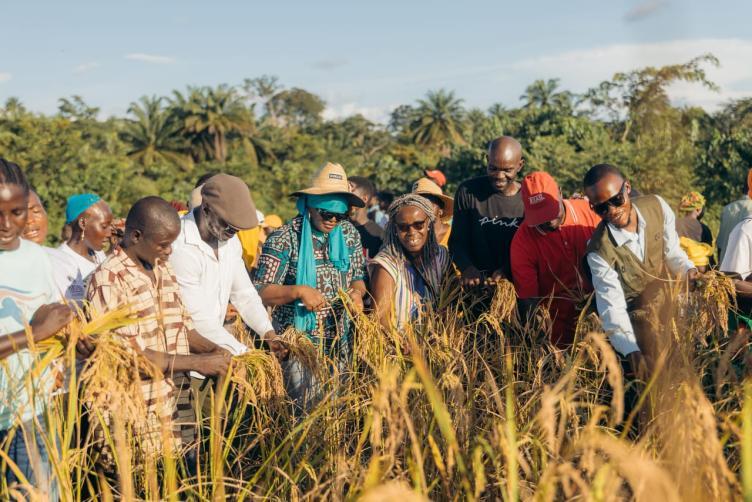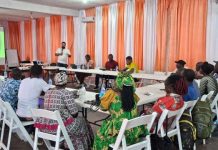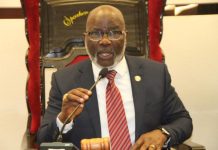Africa-Press – Liberia. Under clear blue skies and the rhythm of traditional drums, hundreds of villagers, local leaders, and guests gathered in the heart of Kpaquelleh Clan, Shankpallai, Zota District, to witness a landmark moment for rural agriculture in Liberia — the launch of a 100-acre upland rice harvest spearheaded by the Panta Pride Foundation (PPF) in partnership with Collective Impact Liberia (CIL).
The vibrant ceremony brought together Bong County Superintendent Loleyah Hawa Norris, community elders, and farmers, all celebrating what many described as a turning point for modern farming and community empowerment in Bong County.
This milestone comes at a critical time when Liberia faces growing challenges in food security. According to the World Food Programme (WFP), more than 2.4 million Liberians, about 47 percent of the population are food insecure, with rural communities being the hardest hit. The Food and Agriculture Organization (FAO) also reports that Liberia imports nearly 70 percent of its rice, the nation’s staple food, costing the economy over US$200 million annually. These figures underscore the urgent need for sustained local production and stronger agricultural systems, a goal that initiatives like the Collective Impact–PPF partnership are actively pursuing.
The rice harvest is part of a broader initiative led by Collective Impact United (CIU) a global social-impact enterprise pioneering systems-based agricultural and economic transformation starting in Liberia. Through its Liberian partners, Collective Impact Liberia (CIL) and the Panta Pride Foundation (PPF), CIU integrates research, innovation, and investment to commercialize smallholder farming, strengthen local value chains, and build sustainable rural economies. The project aligns with and accelerates the Boakai Administration’s ARREST Agenda, particularly its pillars on Agriculture, Roads, Rule of Law, Education, Sanitation, and Tourism, with a strategic emphasis on food security, women’s empowerment, and job creation as pathways to national renewal.
Speaking on behalf of the partnership, Quanuquanei Alfred Karmue, Executive Director of the Panta Pride Foundation, described the initiative as “a collective model for national transformation.”
“We’ve created a platform that attracts international partners to a region many would otherwise overlook,” Karmue said. “Our goal is to commercialize farming—starting at the micro level but with a global vision. While we may not be there yet, we are producing something meaningful that can one day reach markets beyond Liberia’s borders.”
Karmue added that the program is being implemented in collaboration with Collective Impact United, the Foundation for Women, and several other international organizations committed to community-driven agricultural transformation and women’s economic empowerment.
He further emphasized that the partnership is buttressing the national government’s agricultural development agenda, by complementing the Ministry of Agriculture’s efforts to promote “farm-to-market connectivity, mechanized farming, and youth employment in agribusiness.”
Amos Cooper, Farm Manager of the Shankpallai upland rice project, praised the collaboration and noted that the 100-acre site has become a vital source of employment and income for rural families.
“This farm has provided jobs for many people within the community,” Cooper said. “We are committed to delivering tangible results and call on the government of President Joseph Nyumah Boakai to provide greater support to farmers across Liberia.”
Justina Mulbah, Head of the Micro-Farm Unit for Collective Impact, highlighted the project’s positive impact on women’s livelihoods.
“Women from nearby towns and villages are employed on the farm,” she explained. “This project is empowering women and helping them support their families.”
In her remarks, Superintendent Norris lauded the CIU–PPF partnership for its practical contribution to Bong County’s agricultural growth, emphasizing that such grassroots-driven projects are key to achieving the national government’s vision of food self-sufficiency. She credited Quanuquanei Karmue’s leadership for mobilizing community ownership and demonstrating that local innovation can align effectively with government priorities.
“This is an important contribution to our government’s agricultural agenda,” Norris said. “I’m proud of these initiatives, and my administration remains committed to supporting efforts that empower women and boost local productivity, these are the things President Boakai wants to see in Liberia.”
Before the official harvest launch, a World Bank delegation visited several sites under the Panta program, including lowland rice farms in Bellemue, Garmue, and Gbarnga-Siaquelleh towns in Panta District.
Naa Deder Tague, Geospatial Consultant, and Kelvin N. Doesiah, Agricultural Consultant with the World Bank, said their visit aimed to gain firsthand insights into the data-driven approaches being implemented under the program and to assess the partnership’s alignment with the World Bank–funded STAR Project.
The event concluded with a shared sense of optimism about the future of Liberian agriculture, as Collective Impact United, Panta Pride Foundation, and their local and international partners continue to prove that inclusive, science-based farming can transform communities, create jobs, and reduce Liberia’s dependency on imported rice.
For More News And Analysis About Liberia Follow Africa-Press






